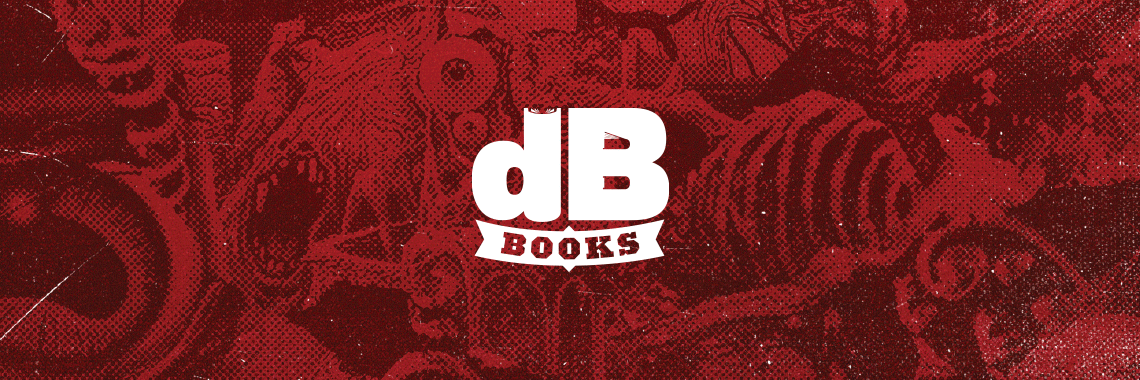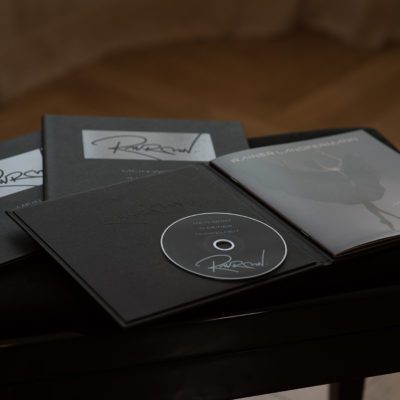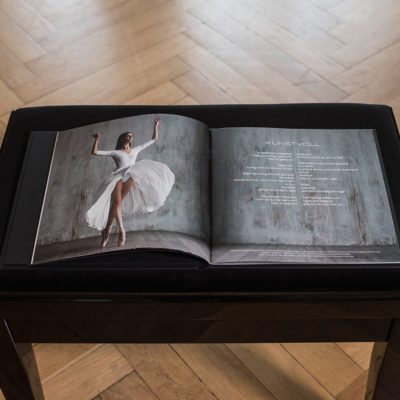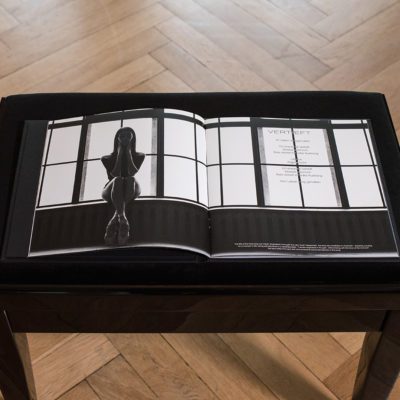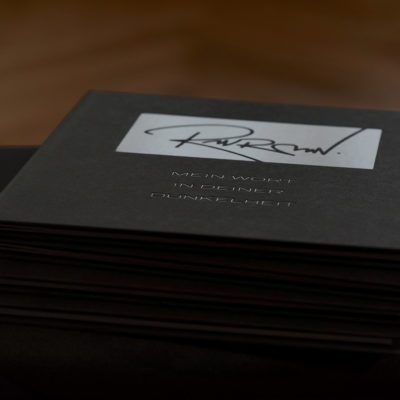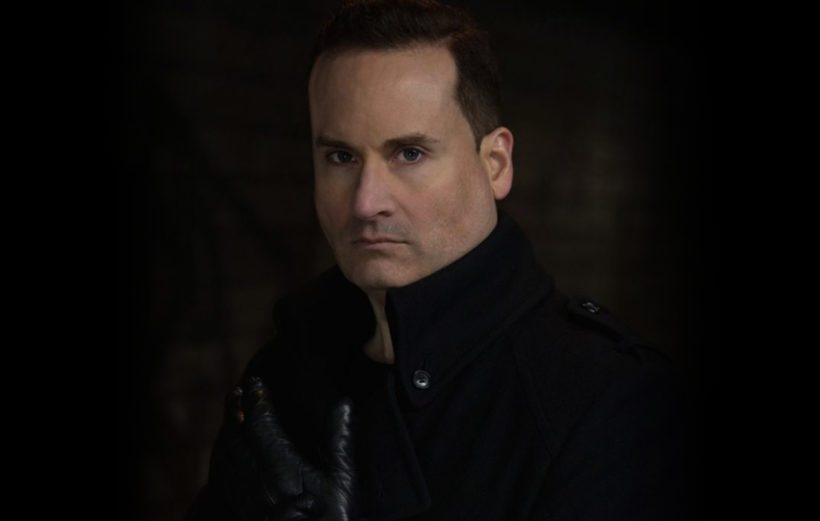
Meine name ist Rainer Landfermann
A manic vocalist, a shredding bassist, a ghost. Musician Rainer Landfermann‘s career can be defined in short bursts: a mould-breaking vocal performance on Bethlehem’s Dictius te Necare, two bass-heavy Pavor full-length albums, and an unexpected guest spot on an Anaal Nathrakh album — these important performances comprise the whisper of the powerful, ill-documented talent that is Rainer Landfermann. For someone whose legend is important to so many, Landfermann’s own presence outside these four performances has been reduced to speculation. What happened to him? How did he get here?
As the current decade draws to a close, now twenty-three years after Dictius te Necare, Landfermann’s disciples finally receive answers with a new album, the creative Mein Wort in Deiner Dunkelheit. The result of ten years of songwriting, planning, and obsession, this dark and deranged solo debut’s concentration on the negative side of beauty manifests as an avantgarde mindwork, one which melts emotions and brains alike.
A dualistic work in itself, Mein Wort in Deiner Dunkelheit exists in two parts. First, Landfermann focuses on practiced, stellar musicianship. To those who know him as a vocalist, it might come as a surprise to hear Landfermann’s abstracted, extraordinarily technical mesh of jazz, classical music, progressive metal alongside the expected black metal base. As if such a list wasn’t overwhelming as is, Landfermann fearlessly weaves between them with disregard, following a jagged path of experimental genre fusion and disruption.
Second is, of course, Landfermann’s identity as a vocalist. To state the obvious, Rainer Landfermann’s vocal presence is that of a raving madman. This unique voice, always pushed to its extreme through howling, shrieking, bellowing, growling, and more, truly pushes Mein Wort in Deiner Dunkelheit over the top in the most memorable of ways. Those who longed for a continuation of Landfermann’s earlier psychosis will find fulfillment here, but hopefully something more through his immense musical creativity.
The veil is lifted, the enigma cast off — Landfermann finally speaks and the time to listen is nigh. An exclusive stream of Mein Wort in Deiner Dunkelheit can be streamed below, paired with a rare interview which features insight into his inspiration and the new album itself.
(Mein Wort in Deiner Dunkelheit will be available digitally and as a sumptuous art book directly from the artist on June 19th)
It’s been a lengthy period of time since your last full-band performance (on Furioso) and even longer since your tenure as a vocalist (on Dictius te Necare). What fueled this period of time, and what made you want to come back after so long?
It’s been a long time indeed! And it’s a long story as well, here’s the short version: A while after the release of Furioso in 2003, PAVOR pretty much completely withdrew from the public. We were bored by the “metal scene” at that time and rejected all requests for interviews and gigs. In the following, each PAVOR member focused on his own activities, some related to music, others not – while still being in contact and friendship. I followed another passion of mine, and built myself a career in information security.
Music has always been vital and important for me, but it took a back seat for some years – it then re-emerged strongly, though, and after an attempt to get together for a new PAVOR release came to nothing, I decided to work on a solo album, intensified by the urge to also sing again. It took me a while to clearly define that project, and write songs for it – the earliest song parts on my upcoming album are from 2008 – but I wasn’t in a hurry. During that period, I wasn’t even sure if I would go public with the material or just compose and record it for myself.
But when the album took shape and everything began to fall into place, it became clear to me that I wanted – and needed – to share it with
the world.
The one song you’ve released this far – “Vertieft” – is an amalgam of influence: electronic music, generalized extreme metal, and a far left field sort of avant-prog. What were your goals for this solo project of yours? What influenced it?
At the very beginning, my idea was to create an album with straight and simple songs and have the focus fully on the vocals. During songwriting, this idea broadened and expanded in a natural way – but even if the finished album does contain a few bass leads, “technical” parts (as in “Vertieft”, for example) and musical finesse, it does not put an emphasis on instrumental virtuosity, and is indeed quite simple and pure in many respects.
Regarding the genres you listed, you can at least add jazz, doom and classical music as potential associations that might arise with the full album. All diversity notwithstanding, I set a high value on each song and the album as a whole to sound homogeneous and inherently
consistent, with a coherent character.
When composing (and in general, actually), I do not think in terms of genres – but simply create the music I hear in my head, or instinctively work with what emerges when playing and improvising on an instrument, without thinking too much. Ultimately, I create the
music that I want to hear myself.
You brought up your vocal style, which has intrigued many and spawned even more contemporaries since 1996’s Dictius te Necare. How did you discover this more manic style and what was it like to revisit it after such a lengthy period of time?
My vocals are pure self-realization and -expression, combined with a passion of being creative, exploring extremes and going over the top. I like it when extreme vocals are expressive and full of emotion, transporting and augmenting the energy of the song, and are multifaceted and multidimensional instead of providing not much more than a rhythm. When performing or arranging vocals, I get inspired by the music and the lyrics, enter the respective mood and atmosphere, and the rest just comes natural.
When I started singing around 1990, some vocalists that I found had something special in their extremity were John Tardy, Martin van Drunen and Chris Reifert. I also love what Jim Gillette does on the first Nitro album (which as a whole is the definition of “over the top”), and King Diamond for his creativity, variety and overall Genius.
The first time I was recording vocals again after the 90s was when ANAAL NATHRAKH asked me to sing on a song of their Passion album in 2010. My voice felt great and even more powerful than back then. The same feeling recurred when I started with the vocals for my album a few years later.
The same sort of “over the top” description (Nitro put it perfectly with their use of the word “outfuckingrageous”) can be attributed to your technical musical prowess as well — something which was expressed through Pavor as well as your more recent works. It is uncommon to hear bass playing like yours in extreme metal. What draws you to these more extreme expressions in music?
While talking about extreme forms of expression, let me emphasize that the song is always the most important thing. Every part is created in service of the song, or album, or higher piece of art in general. Nothing extreme is an end in itself, but simply an innate form of expression in the context of the song. Naturally, the broader your palette of expression is, be it a range in the vocals or a technical skill set on an instrument, the less limited you are in your ways of creation, in bringing your ideas, emotions, inner atmospheres into musical physical reality.
In that sense, it is not extreme expression as such that I find appealing, but an uncompromising, original expression of creativity, personality and emotion, combined with a brilliance in execution.
Did you strive to meet a similar goal for this new album?
Yes, absolutely! These are the great things in music – like hearing a melody or harmony that really moves or touches you emotionally… a lyric that you resonate with because it beautifully puts into words how you feel yourself… an instrumental part, maybe just some notes or a pause at exactly the right place that make you think “wow, that’s just brilliant”… a powerful chorus or vocal line or scream that energizes you… something unexpected that catches you off guard and surprises you in a good way… an amazing production or sound design… and so much more! In short, I love when art is INSPIRING! When composing for my solo album, the only expectations to meet in that regard were my own obviously, but once the music is released to the public… well, I am aware that my music is no easy listening, even in an extreme metal context, and might be a bit demanding of the listener with its variety and forms of expression – but if I can reach just a handful of people in just some of these ways, that’s already fantastic!
Do you prefer that your music is, in your words, demanding?
No, I actually have no preference in that regard. It’s a very relative and subjective term anyway.
Mein Wort in Deiner Dunkelheit is an album of nuance — intonated howled vocals, antics-based composition, and so on. With so many pieces and approaches which go into this album, how did you approach making it?
I started with a curiosity where this project would take me myself. So my simple approach, starting from the initial ideas I already mentioned, was to just begin composing and continue until everything feels right.
One concrete plan I had for the album, though, was that I wanted to record a song with my brother Robert Landfermann and two of his long-term bandmates, Pablo Held and Jonas Burgwinkel – all exceptionally gifted jazz musicians and great guys – in the line-up of piano, double bass, drums and vocals. So I wrote a slow and dark jazz-ballad-like song, somber, yet calm and floating – “Ursprüngliches”.
Considering your aforementioned musical career, people mostly have you pegged as an image of “true, unadulterated metal,” but Mein Wort in Deiner Dunkelheit breaks that image, revealing you to be a true eclectic with musical and extramusical interests which run a vast gamut. Though your name is inextricably tied to your careers as a vocalist and bassist, is there anything you hope people will learn about the real Rainer Landfermann in this, your first solo album?
To me it makes no difference. There is nothing but the “real” me. I am creating art to express myself – the result will, of course, depend on
the context I’m creating it in (e.g., time, experiences, musicians I’m playing with, band concepts), but it’s all my truth. PAVOR also had influences from jazz and classical music, by the way, but they manifested in the music relatively indirectly, so that – I agree – it could be classified as unadulterated metal. And if, at any time in the future, we record another PAVOR album, this definitely will not change.
The liner notes dictate that this album is primarily about beauty, manifested in the paired visuals of ballerinas and dancers. Could you go further into this?
While the album deals with a wide range of subjects, ultimately, it is about beauty – its experience, appreciation, and sometimes, the painful loss of it. A large part of the lyrics deals with relationships… often, but not exclusively, exploring the dark and melancholic sides of them, in a highly emotional and expressive way.
On closer inspection, there is a lot of beauty not only in the light and positive moments (where it absolutely shines of course), but also in the extremely dark and painful ones – beauty in the introspection, the learning, the growth, and the contrast the pain provides in relation to the positive times.
With the subjects of relationships and beauty, and the perception that there’s hardly anything more beautiful than the female body in combination with the feminine essence and spirit expressed through it, it was clear for me that I wanted to have the album artwork feature a beautiful woman, depicted in a passionately graceful manner.
I love the aesthetics of female ballet, and the elegance and grace it expresses, and so I was looking for a ballerina model and photographer that I could create the artwork with. I’m very glad I found ballerina Anna Grigoryan and ballet photographer Daria Chenikova, both from Moscow, who did a fantastic job of realizing my ideas and concepts for the photos – of creating, for each of the ten songs on the album, a gorgeous visualization of the theme and mood of the respective music and lyrics.
Now that the lengthy period of time leading up to the album has passed and Mein Wort in Deiner Dunkelheit nears its release date, what comes next? Will we ever see this material performed live? Is new material in the works?
I currently have zero interest in playing live, so there are no plans in that regard.
It’s too early to talk about in detail, but I have a lot of ideas for new material, including, once again, collaborations with other artists, which I enjoyed very much on Mein Wort in Deiner Dunkelheit!

